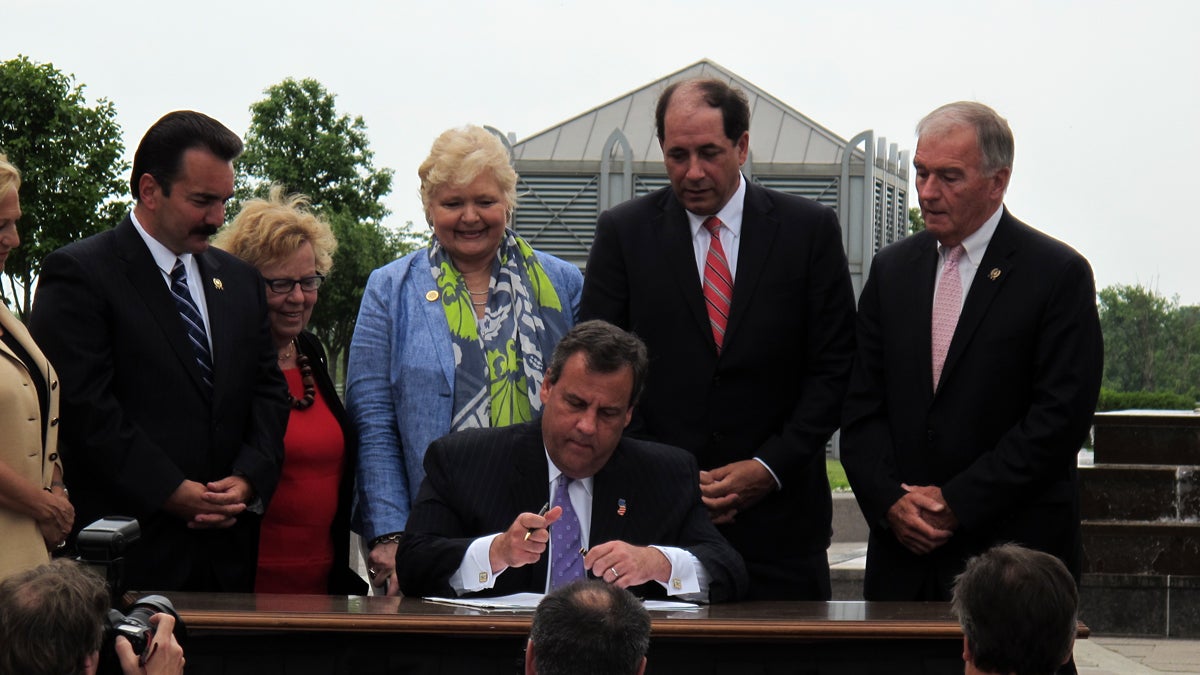N.J. law opening adoption records offers privacy to birth parents, civil rights to adoptees

N.J. Gov. Chris Christie signs the adoption records access bill into law. (Phil Gregory/for NewsWorks)
After more than 30 years of debate, New Jersey now has a law opening birth records and essential medical information to adoptees in the state.
Signed into law by Gov. Chris Christie Tuesday, the law won’t kick in immediately. Birth parents of children adopted before August of next year will have until the end of 2016 to request that their names be blacked out on the certificates.
In the future, birth parents will have the option of stating their preference on whether and how they want to be contacted by children given up for adoption.
The quest to remain anonymous has been a sticking point in previous legislative attempts to allow adoptees easy access to vital information about their past.
The new law balances the concerns of birth parents with the needs of adoptive children, Christie said.
“We’ve been working together to find a sensible middle ground that protects people’s privacy but that gives adopted children and their parents access to information when they get older in order to care for themselves and their children,” he said.
Pat Brannigan, the executive director of the New Jersey Catholic Conference, said church officials will do their part to make sure birth parents are aware of their ability to preserve their privacy by publishing that information in the parish bulletins distributed at Mass in Catholic churches throughout the state.
“We want to honor that confidentiality,” Brannigan said. “So you don’t want to send a registered letter to somebody, saying you have this record, because maybe their family or spouse never knew they had given a child to adoption.”
By the time the law takes effect, state Sen. Diane Allen said, most birth parents will know about their right to have their names removed from birth records.
“We believe that the two and a half years that people now have is plenty of time to find out about it and to take care of it,” she said.
In other states that have opened birth records to adoptees, Allen said, less than 1 one percent of parents have asked that their names be redacted.
Peter Franklin, the founder of Adoptees Without Liberty, said Tuesday he has some concerns about the redaction provision, but said he recognized the need to include it in order to have the compromise measure enacted.
“We are going to be hurt when our fellow adopted people get a birth certificate with a black mark on it, but it tells you that your birth mother is still alive which is good to know because many of us find graves,” he said.
During the signing ceremony, Christie said his sister and the father of her four children were adopted.
“The lack of knowledge and information that they can pass on to their own children has been a cause of great concern and stress for them over the years,” he said. “So this is one of those issues that I not only understand as a governor but that I understand as a brother.”
For Morristown resident Pam Hasegawa, the issue is personal. Waiting for 34 years for such a law to be passed, the adoptee said Tuesday she felt relieved — and empowered.
“We feel like we’re no longer two-thirds of a person. Not being allowed to know who you were when you were born is just absurd, and it’s diminishing, it’s demeaning,” she said “I think we’ll stand taller.”
WHYY is your source for fact-based, in-depth journalism and information. As a nonprofit organization, we rely on financial support from readers like you. Please give today.




